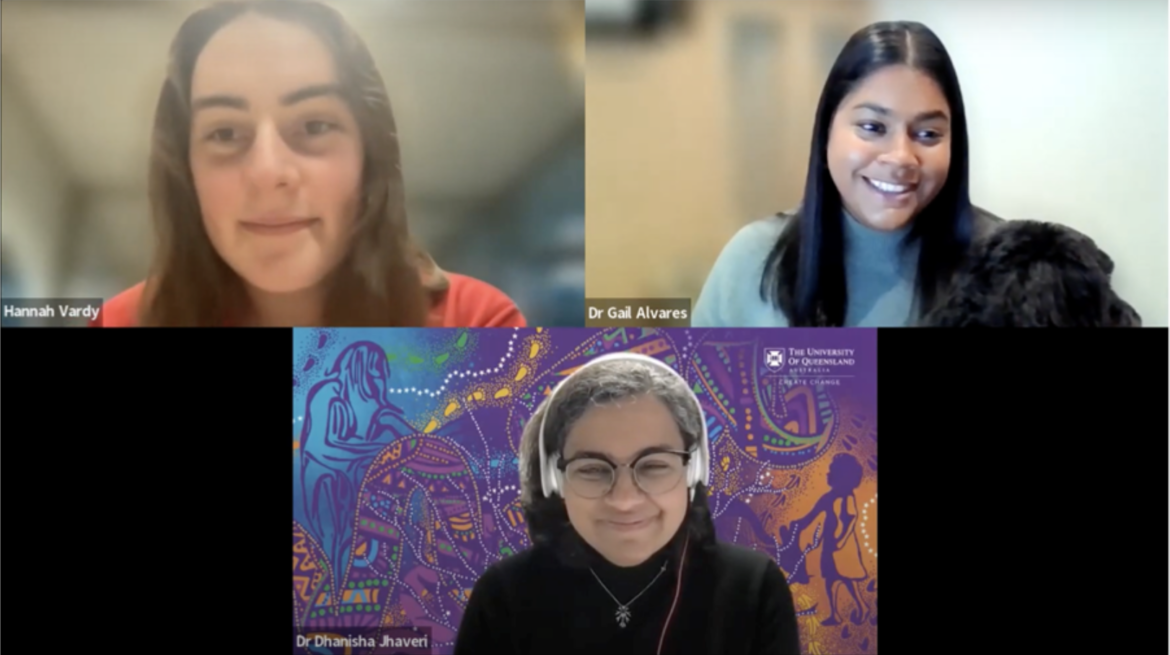“I think, therefore I am,” is the famous maxim from René Descartes. But how do we think? Why do we think? How do our brains process information and form thoughts, emotions, and philosophical conundrums? This is the basis of the field of neuroscience: to understand the workings of the brain and nervous system that ultimately creates who we are, what we do, and why we do what we do.
In the latest session of the NYSF Connect Webinar Series, we got an inside look at what neuroscience is all about from two expert neuroscientists who are trying to unlock the secrets of our brains: Dr Dhanisha Jhaveri, a Senior Research Fellow at the Mater Research Institute, University of Queensland, and a faculty member of the Queensland Brain Institute, and Dr Gail Alvares, a Senior Research Fellow at the Telethon Kids Institute and the University of Western Australia in Perth. NYSF alumna Hannah Vardy hosted the evening’s event, and it was truly a fascinating conversation!

Dr Jhaveri's work focuses on understanding the mechanisms of neuroplasticity related to the generation of new cells in the adult brain and how this impacts behaviour and function; particularly in relation to stress-induced mental health issues such as depression and anxiety. Dr Jhaveri described neuroplasticity as changes in the structure and function of cells within the brain and as the foundation of our ability to learn and change and adapt as humans - this is a big leap from the traditional idea that the brain cannot generate new neurons after birth! Dr Jhaveri was enthusiastic about the prospects of neuroscience and the discoveries to be made, especially about the relationship between structure and function in the brain.
Dr Alvares works primarily with brain development and the ways brain development may not conform to “the norm” in neurodevelopmental conditions like autism. Dr Alvares frequently works with parents of children who are diagnosed with autism, and her research focuses on how to best support these children and families to cope with environments not ideal for them. Dr Alvares also helped set up the Australian Autism Biobank: a collection of biological samples from children with autism that's available to researchers to access and use for research into autism. One incredible outcome which has arisen through the biobank concerns gut health; previously, it was thought that gastrointestinal issues may have been causal in autism, but research using the Australian Autism Biobank has shown that, in fact, the differences observed in gastrointestinal function in children with autism is actually a result of their diet, which can often be highly restricted in autism.
Both Dr Jhaveri and Dr Alvares emphasised the importance of an interdisciplinary approach to neuroscience and said that it is essential to bring other fields and expertise in to get new perspectives and to get the most out of research in order to make discoveries that would not be possible otherwise. They encouraged anyone looking at entering the field to look into dual specialisations rather than just neuroscience alone because this is becoming more and more relevant in research into the future.
They finished the evening with a nod to curiosity:
“I think that curiosity, or wanting to always find out more, is something you should always hold onto because even if you are specifically interested in a particular area, having blindsides and wanting to look at that particular area is never a good idea. It’s always great to still be really curious and interested in lots of different areas because you never know how they might contribute.” - Dr Alvares
Dr Jhaveri replied, “Absolutely! I think that’s the essence of the discovery process; without curiosity, discoveries don’t happen, and I think the discovery process is something that everyone should get a chance to enjoy, no matter which field you are in.”
Wise words from two exceptional neuroscientists and Women in STEM role models! We are so grateful to both Dr Jhaveri and Dr Alvares for donating their time and expertise to support our NYSF alumni, as well as their parent organisations and two of our incredible NYSF partners: The University of Queensland and the Telethon Kids Institute. The support of our partner organisations makes the NYSF possible, and we thank The University of Queensland and Telethon Kids for their ongoing commitment and collaboration in providing STEM education and outreach to young Australians.